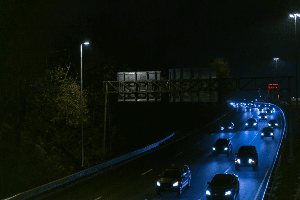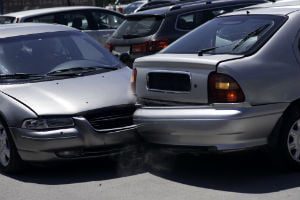TAP TO CALL
Hablamos Español
 Rollover crashes cause 30 percent of all traffic deaths, according to the National Highway Traffic Safety Administration (NHTSA), yet they account for a tiny percentage of all motor vehicle accidents. Understanding the factors that increase the likelihood of a rollover crash could help you avoid being injured in one.
Rollover crashes cause 30 percent of all traffic deaths, according to the National Highway Traffic Safety Administration (NHTSA), yet they account for a tiny percentage of all motor vehicle accidents. Understanding the factors that increase the likelihood of a rollover crash could help you avoid being injured in one.
At Lynch Law Firm, PC, we explain the common driver errors and contributing factors that can lead to a rollover crash and the steps you can take to avoid them. We also discuss what you can do if a negligent driver injures you or a loved one in a rollover car accident.
We have been helping injury victims for decades, including those injured in rollover crashes, head-on collisions, T-bone accidents and more. Our experienced vehicle crash attorneys in New Jersey have a history of proven results, and we are prepared to fight for maximum compensation on your behalf.
Request your FREE case review today. (800) 518-0508
As the name implies, a rollover crash is what happens when a vehicle either flips onto its roof or tips onto its side during a collision. That said, these crashes are further classified in two ways: as either a tripped rollover or an untripped rollover.
A tripped rollover can occur when the vehicle interacts with external factors or obstacles. When a vehicle hits something external, it creates a sudden increase in lateral force, triggering the vehicle to flip over and roll. This type of vehicle rollover is the most common. External factors that can cause a vehicle to rollover include:
Tripped rollovers may also result from a side impact with another vehicle, or it can be the result of tires digging into soft or uneven ground.
An untripped rollover crash can occur without any external factors or obstacles. In this type of rollover, it is the internal forces and dynamics causing the vehicle to overturn. Most often, the factors impacting this type of rollover include high-speed turns, abrupt maneuvers or the vehicle’s overall design and stability. Untripped rollovers are especially dangerous to vehicle occupants, as they may get thrown around the cabin of the vehicle. If occupants are not restrained with a seatbelt, they could be ejected. Often the victims of untripped rollovers are far more likely to suffer catastrophic or fatal injuries.
There are a number of behaviors and circumstances that can lead to a rollover crash, such as:
These additional factors further increase the possibility of a rollover crash occurring:
Certain vehicles, especially those with a higher center of gravity, are much more susceptible to a rollover crash. These vehicles include:
Rollover crashes often happen at fairly high speeds. This is especially true when drivers take sharp turns or attempt evasive maneuvers to avoid a road hazard. It is the combination of both speed and the sudden change in direction that can cause the driver to lose control and head into a rollover.
The drivers of most vehicles involved in a single-vehicle rollover crash resulting in a fatality were engaged in routine driving maneuvers. For instance, approaching a turn, taking a curve or driving straight.
Rollover crashes, especially those involving a single vehicle, happen more often on rural roads. The biggest reason is that these roads may be poorly maintained, have no barriers and are more dangerous overall. There may also be less visibility, especially at night. Other issues may include badly placed signage or inadequate warnings about potential road hazards, such as upcoming curves.
Drivers who are impaired by alcohol, drugs or other substances are more likely to speed or exhibit aggressive driving behavior. Drowsy drivers may easily miss a road obstacle, sharp turn or other road hazards.
Caring for your tires, including replacing them as needed and keeping them properly inflated, is a critical step in avoiding a rollover crash. Make sure your vehicle is not top-heavy, such as when loading cargo for a trip or transporting items for a move. Poor weight distribution can impact a vehicle’s stability during certain maneuvers.
As a driver, you can avoid causing a rollover crash and make your journey safer by taking these steps:
At Lynch Law, PC., we are dedicated to helping victims who have been injured due to the negligence of others.
Not sure if you have a valid case? We offer a completely free case review. Simply call our law offices anytime, 24/7, and we can determine whether you may have legal options for seeking compensation for your damages.
If you have a case and we represent you, there are zero upfront costs to pay. We only get paid if you do.
We are here to help. (800) 518-0508
 A night of fun could leave you feeling worse for the wear the next morning as celebrating morphs into the dreaded hangover. While many people are aware of the discomfort they may experience, few consider its potential impact on driving safety. And while you may not be legally drunk hours later or even the next morning, is driving while hungover dangerous?
A night of fun could leave you feeling worse for the wear the next morning as celebrating morphs into the dreaded hangover. While many people are aware of the discomfort they may experience, few consider its potential impact on driving safety. And while you may not be legally drunk hours later or even the next morning, is driving while hungover dangerous?
In this blog post, the attorneys at Lynch Law Firm, PC explore the effects of driving with a hangover, including why it is a crash risk and the potential legal issues that could result.
Do you need legal help after a collision involving a drunk or hungover driver? Call our law offices 24/7 to get your questions answered. Our New Jersey auto accident lawyers are experienced and ready to help.
FREE case reviews. Call (800) 518-0508
A hangover is more than just a headache accompanied by a queasy stomach. It often comes with other unpleasant symptoms, including:
These symptoms should be taken seriously, because they can significantly affect your ability to operate a vehicle safely. Your reaction time to road hazards slows down, judgment also becomes impaired, and your coordination suffers. All these skills are critical and help you to operate your vehicle safely.
It’s important to distinguish between driving impaired due to alcohol consumption and driving while hungover. Driving under the influence of alcohol is illegal and greatly increases the risk of a catastrophic accident.
On the other hand, even if your blood alcohol concentration (BAC) is not above New Jersey’s legal limit, all drivers owe a legal duty to prevent causing harm to others. Keeping this in mind, when you drive with a hangover, you are still impaired, and the aftereffects could significantly increase your risk of a crash.
Driving while hungover might not have the same legal consequences as driving under the influence. However, it can still be considered negligent behavior.
Negligence means failing to exercise reasonable care. Drivers who cause a crash while driving with impaired abilities could be held liable for damages. Victims injured in these collisions might seek compensation for medical expenses, property damage, and more.
It is not possible to give an exact time, because how quickly alcohol wears off varies from person to person. It depends on several unique factors, including your body weight, age, even your gender. Women tend to take longer to overcome the effects of alcohol simply because they inherently have less water in their bloodstream. If you are younger, you also have more water in your bloodstream, which means it will take longer for the alcohol to wear off.
Regardless of your age or any other factor, it is best to avoid driving while you still feel the effects of a hangover. Getting behind the wheel and driving puts your safety at risk, as well as the safety of others.
If you find yourself hungover after a night of drinking, consider these alternatives:
Remember to ask yourself if getting behind the wheel when you are feeling hungover is worth the possible risk of getting into a crash. That is a decision that could have a lasting impact on you.
Ridesharing is a 24/7 option that gives you a much better chance of getting safely from your party to your home or a nearby hotel. Take advantage of it. You may be able to share the cost if you have other friends who also need safe transportation after a night of celebrating.
If you know your host well enough, ask if you can stay over and wait until the effects have worn off.
If nearby, try to arrange for a friend or family member to pick you up from your night out.
In short, it is better to avoid the risk of a crash, as well as the potential legal consequences. It is true that with a hangover might not carry the same legal penalties as for driving under the influence. However, it is still important to recognize the potential risks and consequences. Your safety and the safety of others sharing the road are critical factors to consider.
If you have been involved in an accident due to the negligence of a hungover driver, we strongly recommend consulting an attorney to discuss your rights and potential legal options.
At Lynch Law Firm, PC, we are here to help. Our firm has decades of experience representing victims injured by the negligence of others. If we represent you, there are also no upfront costs to pay. Check out what others have said about the services we provided.
We are here to help you through this difficult time. Not sure if you have a case? Call to request a free case review. There is no obligation and no risk to you.
Millions Recovered. Call (800) 518-0508 to get started.
 Driving at night can significantly increase the risk of a collision. For this reason, drivers on the road after dark should take additional precautions to avoid a crash. If they do not, and a crash occurs, victims of the accident may be able to recover compensation for their damages.
Driving at night can significantly increase the risk of a collision. For this reason, drivers on the road after dark should take additional precautions to avoid a crash. If they do not, and a crash occurs, victims of the accident may be able to recover compensation for their damages.
If you were injured in an accident at night, call our New Jersey auto accident lawyers today. We provide a free legal consultation to discuss your claim. There are also no upfront fees while we investigate and build a strong case for compensation.
Below, we discuss the dangers of nighttime driving and what your legal options may be if you are injured in a crash.
After sunset, visibility is low, even if there are streetlights lining the roads and every driver is using his or her headlights. Although our eyes adjust to low-light settings, there are some things the human eye is not likely to see very well in the dark. However, low visibility is just one concern when driving at night.
Other hazards of nighttime driving include the following:
While impaired driving is not exclusively a nighttime driving issue, it is generally more common. According to the National Safety Council (NSC), impaired drivers are most frequently on the road between the hours of midnight and 3 a.m. Intoxicated drivers are more likely to be heading home from a night out at a bar, restaurant or friend’s house during that time.
The combination of low visibility and alcohol or drug impairment significantly increases the chances of an accident.
Alcohol or drugs, even prescription medication, can result in fatigue or drowsiness at any time of day. But these are not the only things that cause driver fatigue behind the wheel. Extended work hours, long-distance driving or a broken sleep schedule may also contribute to drivers feeling tired.
The low-light setting is another factor that contributes to driver fatigue and can cause some people to fall asleep behind the wheel.
When daylight savings time ends and the sun begins to set earlier, drivers unaccustomed to leaving work after dark may feel also more tired.
The roads are usually emptier after dark. Some drivers might use this as an excuse to drive well over the speed limit. This creates an unnecessary risk for other drivers. Speeding while it is dark out is especially dangerous due to decreased visibility. A speeding driver has less time to react to an unexpected hazard or road obstruction.
New Jersey has many rural counties in the state, so there is much wildlife around the area. Deer are a significant problem, even in suburban areas. However, drivers may also encounter smaller critters like raccoons and opossums. These animals are nocturnal, so they are a lot more active at night. With their dark fur, they may be difficult to see at night. Once drivers do see them, they may swerve to avoid hitting one. Sometimes, this causes a driver to end up hitting another vehicle instead.
Pedestrians may also be at greater risk of getting hit by a car at night, especially if their clothes do not reflect light well. People walking home from parties is common at night. Some pedestrians may be distracted by their phones or impaired, which means they may not notice oncoming traffic.
If visibility is low, such as after dark, drivers are also expected to take additional precautions to avoid a crash. This means reducing speed, being more attentive or staying farther back from other vehicles.
Drivers should always avoid distractions, but texting may be even more hazardous at night since the light from a cellphone may affect a driver’s vision.
While driving at night, drivers should also have their headlights on and ensure their taillights are working properly.
If you were involved in an accident with a vehicle at night, you need to provide evidence of negligence. One example of this is if the driver neglected to fix broken taillights. If this leads to a crash, that driver could be held at least partly liable. Drivers are required to keep their vehicles maintained and in safe operating condition.
Proving either broken or unused lights can be challenging. However, an attorney can help you to gather strong evidence that may help prove your claim, including:
It is important to note that even if a vehicle had broken taillights, you still have a duty to react reasonably to the other driver’s negligence. The insurance company will likely try and use this against you to deny your claim. That is why you should have an experienced lawyer on your side who is prepared to build a strong case and fight back against the insurance company.
If you were injured by another driver’s negligence while driving at night, you may be eligible for compensation. Let our attorneys walk you through the process of filing a claim. Our attorneys can focus on the legal aspects of your case while you focus on getting the treatment you need.
The consultation is free, and there are no upfront fees.
Call (800) 518-0508 to schedule a free consultation.
 Insurance companies often look for any reason to deny or devalue a claim. Inconsistency in your statements could ultimately be used against you as a reason to deny you compensation.
Insurance companies often look for any reason to deny or devalue a claim. Inconsistency in your statements could ultimately be used against you as a reason to deny you compensation.
You should consider speaking to a New Jersey car accident lawyer before you make any statements to the insurance company. An attorney can help determine what to say to the insurance to protect the claim, or he or she could deal with the insurance company for you.
At Lynch Law Firm, PC, the initial consultation is free of charge so there is no risk to you.
A common misconception among injury victims is that insurance companies will not offer a settlement unless the person has suffered serious injuries. Although insurers often devalue injury claims, it does not mean you need to exaggerate your minor injuries.
Exaggerating the extent of your injuries is dishonest and could ultimately hurt your claim because the insurance company could use this against you.
Remember, there are several tactics used by insurers to devalue claims, including putting injury victims under surveillance. If you exaggerate a back injury but are caught on camera performing an action you claimed you could not do, it could undermine your claim and ultimately lead to it being denied even though you did suffer an injury.
When a claim is filed, the injured person usually speaks to an adjuster assigned to the claim. Generally, they will ask that you provide a recorded statement to assess the extent of your damages. During this conversation, the adjuster is likely to ask about the seriousness of your injuries.
Insurance companies document every statement you make to them, including statements about your injuries. Consistent statements help to prove you have been injured. Consistently gives the insurance company very little to use against you.
When discussing the accident with the adjuster, it is important to use clear, simple language and stick to the facts. You should not make assumptions about the accident or your injuries. Remember that insurers often try to trick injury victims into saying something that may hurt them later.
When you share more information than is asked, you could inadvertently say something that calls past statements into question. You could also make statements that sound like admissions of fault. For example, if you say you were in a rush when a car crash happened, the insurance company may say you were distracted and are to blame for the accident.
Anything you are unsure about when speaking to the insurance company should be discussed with your attorney. He or she may be able to relay this information to the insurance company to help protect your credibility.
It may be helpful to write down what you plan to say to the insurance company and review it with your lawyer. Stick to the script to help protect your claim. You may also want to take notes while talking to the insurance company and write down what you said after the phone call or conversation has concluded.
Consistency in your statements to the insurance company is important because it protects your credibility and may help you recover the compensation you need for your medical bills, pain and suffering, and other damages.
Since 1994, our firm has been a staunch advocate for the injured, helping defend their rights against negligent parties and dishonest insurance practices.
We work on contingency, meaning we do not charge you any hourly fees and only get paid if we successfully recover compensation on your behalf.
Call today for a free consultation: (800) 518-0508
 If you or someone you love was injured in an accident, it is important to speak to a qualified injury lawyer before communicating with the insurance companies. Having legal representation on your side could make a significant difference in whether you are able to secure a fair settlement for your claim.
If you or someone you love was injured in an accident, it is important to speak to a qualified injury lawyer before communicating with the insurance companies. Having legal representation on your side could make a significant difference in whether you are able to secure a fair settlement for your claim.
Below, our lawyers at Lynch Law Firm, PC provide some helpful advice about why you should refrain from saying anything to an insurance adjuster until legal help is sought. We are prepared to discuss your situation in a free case review. We charge zero fees upfront and only get paid if we secure compensation for you.
The first thing you should do after sustaining an injury is get examined by a health care professional. If you were injured in a car accident it is important to report it to the local police. If the injury occurred at work, you should immediately notify your employer.
If you wait too long to report your injury or visit a health care professional, it could hurt the value of your claim. Insurance companies could use this as a reason for devaluing or denying your claim. While it is important to notify your insurer about the injury, you should only give them basic information such as when and where the accident occurred, and do not provide a written or recorded statement.
Instead, let your lawyer handle all communication with the insurance adjusters and lawyers from the other side. If you make a mistake with your statements, it could cost you significant compensation. The New Jersey personal injury lawyers at our firm know what to say, and what not to say, when it comes to maintaining the value of an injury claim.
Insurance adjusters are known for using what is known as “bad faith tactics” to try to find a reason for devaluing or denying injury claims. It is important to learn these tactics so you do not get caught off-guard, should you find yourself in one of these situations.
One prime tactic insurance adjusters often use is contacting the injured party immediately after the accident. The reason why they do this is because they want to get you to say or do something that may hurt your claim, before you get to speak to an attorney and learn your rights. They may seem friendly and helpful and may even try to convince you that hiring an attorney is unnecessary. However, this is not good advice if you plan to pursue full compensation for your injury and damages.
Another tactic insurance adjusters may try to use is getting you to provide a written or recorded statement. However, you are not required by law to do this. Simply tell them that your attorney will be contacting them to answer any questions they may have.
Insurers could also use social media to track you and the status of your injury. For example, if you suffered a broken leg in an accident and post something online saying that you feel great and are seen running around in a video, it could be used against you. The insurer could say that your injuries are not severe, therefore, your injury claim may be devalued or denied.
Determining the value of your injury claim can be difficult without the help of a legal professional. An experienced lawyer will know how to properly investigate the cause of the accident, your medical diagnosis and the insurance policies involved.
At Lynch Law Firm, PC, we are committed to pursuing the maximum compensation allowed under the law to help victims of negligence. Call our firm today to schedule your no cost consultation. You are under no obligation to commit to our services and we do not charge fees unless we help you win.
There is no risk in calling us at (800) 518-0508 today.
 After a car accident, an insurance adjuster may reach out to you and try to get a recorded statement. However, this is an attempt by the insurance company to obtain evidence that can later be used against you. Similarly, the insurance adjuster may look for statements you made at the scene of the accident in order to diminish your claim for compensation.
After a car accident, an insurance adjuster may reach out to you and try to get a recorded statement. However, this is an attempt by the insurance company to obtain evidence that can later be used against you. Similarly, the insurance adjuster may look for statements you made at the scene of the accident in order to diminish your claim for compensation.
The trusted New Jersey car accident attorneys at our firm discuss why you should err on the side of caution when speaking to anyone involved after the car accident. Let us help protect your claim by scheduling a free consultation to learn more about your legal options.
Car accident claims are a question of who is responsible for paying for the damages. To determine this, the insurance companies involved will look to the evidence at the crash scene. They may also evaluate statements made by each of the drivers, as well as any witnesses. Anything that you say at the scene of the accident could potentially be used against you.
For this reason, it is important not to say any of the following:
Any of these statements may be seen as admitting fault for the accident. Even if this is not what you meant, your statements could be interpreted as accepting responsibility for the accident.
Other statements that could negatively impact your claim include:
One important reason why you should be careful about what you say after a car accident is that you may be incorrect about what happened. Even if you believe you were partially at fault for the crash, you may not know all the factors involved in the case. The other driver could have been:
Any statement that you make can potentially be misunderstood or misinterpreted. A witness to the car accident may not hear you correctly and may state that you said one thing, when you actually said the opposite. A statement that you make with one meaning may be interpreted as something else. Stick only to the facts when you report the accident and avoid making unnecessary comments.
Victims injured in car accidents have a right to be compensated for any damages sustained due to the actions of a negligent driver. However, insurance companies often try to use certain tactics to trick you into saying or doing something damaging that could greatly affect your claim for compensation.
Our legal team at Lynch Law Firm, PC are prepared to protect your best interests by handing all communications with the insurance company on your behalf. Contact us today to schedule a free, no-obligation consultation. There are no upfront fees unless we help you recover favorable compensation.
We look forward to helping you. Call (800) 518-0508 now.
 While driving in a parking lot, motorists are often at an increased risk of being involved in a car accident. In fact, more than 500 people are killed and approximately 60,000 victims suffer injuries in parking-lot car accidents each year, according to the National Safety Council.
While driving in a parking lot, motorists are often at an increased risk of being involved in a car accident. In fact, more than 500 people are killed and approximately 60,000 victims suffer injuries in parking-lot car accidents each year, according to the National Safety Council.
Due to the risks posed to motorists and pedestrians, it may help to know how to avoid some of the hazards found in parking lots and understand when another driver is at fault for an accident. Below Lynch Law Firm, PC’s New Jersey car accident lawyers have provided several tips for how to avoid a car accident in a parking lot. If you are in need of legal representation after a car accident, contact us to schedule a free, no obligation consultation. We will help you find out if you have the right to pursue compensation from the at-fault driver.
There are several types of car accident motorists can experience in parking lots. Some of the most common types of parking lot accidents happen when:
There are several things that you can do to reduce the risk of being involved in a parking lot accident, including:
Unlike most roadways, parking lots do not have as clear right-of-way rules. In most parking lots, there are lanes with parked cars on both sides and through lanes around the perimeter of the parking lot.
The general rule is that vehicles in through lanes have the right-of-way. Vehicles that are parked or that are approaching the through lane must yield the right-of-way to motorists already traveling in the through lane. However, if there is a yield or stop sign that the driver in the through lane ignored, he or she may be found at fault for an accident.
When pulling out of a parking space, you must yield to approaching vehicles. Drivers who are exiting a parking space must ensure it is reasonably safe to back out into the through lane.
If you have been involved in a parking-lot crash, you should immediately take action to secure your car accident claim. This includes:
If you were injured in a parking lot accident and are considering filing a claim, it is important to consult with an experienced attorney as soon as possible.
Lynch Law Firm, PC’s personal injury lawyers in New Jersey have helped numerous car accident victims pursue claims against negligent drivers. During your free consultation, we will review your collision and determine if the other driver can be held liable for the damages you sustained.
If we find that you have a case, we will help you pursue the maximum compensation you deserve. Our attorneys charge clients on a contingency fee basis, and will only require payment if we obtain compensation on your behalf.
Complete a Free Case Evaluation form to find out if you have a case.